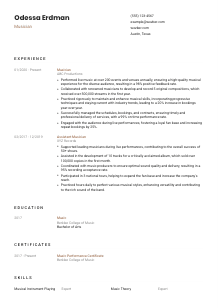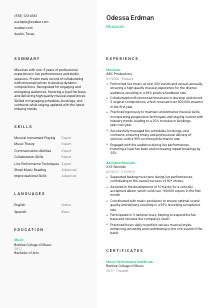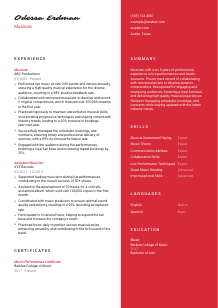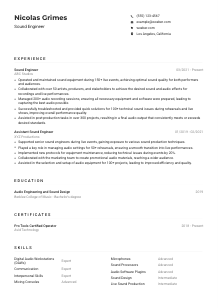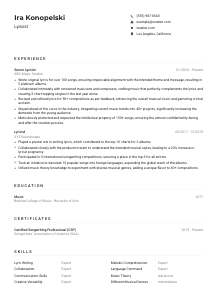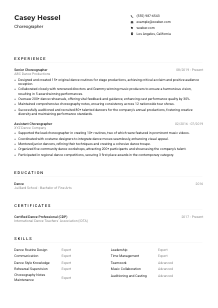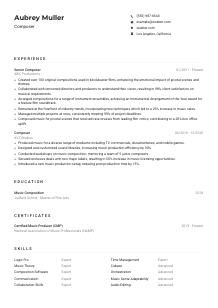Musician Resume Example
Strumming melodies, but your resume feels off-key? Harmonize with this Musician resume example, orchestrated using Wozber free resume builder. Learn how to tune your musical talent into job notes, composing a career crescendo that resonates with employers and fans alike!
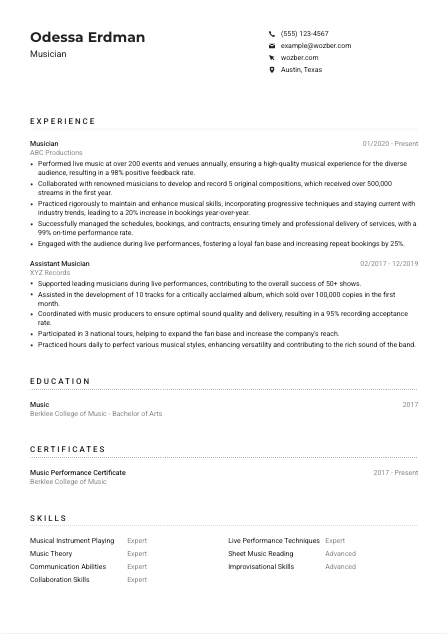
How to write a Musician Resume?
Greetings, aspiring maestro! The journey to a successful career in music is both thrilling and demanding, with every audition or job application acting as a crucial performance. Your resume isn't just a document; it's your opening act, a prelude to your professional prowess.
Armed with Wozber's free resume builder, we're diving into the symphony of crafting a resume that strikes a chord with employers and sails smoothly through Applicant Tracking Systems (ATS). Prepare your instruments; it's time to compose a resume that conducts your career towards its next standing ovation.
Personal Details
The personal details section is where you cue the overture. It paints a portrait of the artist behind the resume. Let's fine-tune this section, ensuring it harmonizes with the Musician position and reverberates through the concert hall of your potential employer's interest.
1. Your Name: The Headliner
Your name is the marquee of your personal brand. Amp up the volume by using a clear, legible font that ensures your name is memorable at a glance. Picture it as the title on a concert poster—make sure it's the headline that everyone remembers.
2. Job Title: The Setlist
Directly below your name, feature the role you're auditioning for—"Musician." Like a well-chosen setlist, this primes the audience (in this case, the hiring manager) on what to expect, setting the stage for a performance that's strictly in tune with their needs.
3. Contact Encore
Your contact information should echo clarity and professionalism. A straightforward email (firstname.lastname@email.com) and a reliable phone number are your backstage passes—ensuring the hiring manager knows exactly how to bring you in for the main event.
4. Location: The Tour Stop
"Must be located in Austin, Texas." The job description sings it clearly, so your location echoes back, Austin, Texas. This instantly lets the hiring manager know you're ready for the gig, with no relocation delay hitting the pause on your performance.
5. Professional Profile: The Album Cover
Think of adding a LinkedIn profile as choosing the right album cover—it's the visual that represents your brand. Ensure it's updated, mirroring the professionalism and achievements listed on your resume. It's the teaser that leads to the full album (your career).
Takeaway
The Personal Details section is your resume's opening chord, setting the stage for a virtuoso performance. It's more than just a formality; it's the first opportunity to resonate with the hiring manager. Craft it with care, ensuring it harmonizes perfectly with the role at hand. You're not just a musician; you're the headliner they've been waiting for.





Experience
Now, onto the main act — your experience section. This is where you showcase your past performances and tours, proving you're more than ready for the spotlight. Tailoring this section to reflect the music industry's specific nuances can transform your resume from a garage band demo to a platinum record.
- Performed live music at over 200 events and venues annually, ensuring a high‑quality musical experience for the diverse audience, resulting in a 98% positive feedback rate.
- Collaborated with renowned musicians to develop and record 5 original compositions, which received over 500,000 streams in the first year.
- Practiced rigorously to maintain and enhance musical skills, incorporating progressive techniques and staying current with industry trends, leading to a 20% increase in bookings year‑over‑year.
- Successfully managed the schedules, bookings, and contracts, ensuring timely and professional delivery of services, with a 99% on‑time performance rate.
- Engaged with the audience during live performances, fostering a loyal fan base and increasing repeat bookings by 25%.
- Supported leading musicians during live performances, contributing to the overall success of 50+ shows.
- Assisted in the development of 10 tracks for a critically acclaimed album, which sold over 100,000 copies in the first month.
- Coordinated with music producers to ensure optimal sound quality and delivery, resulting in a 95% recording acceptance rate.
- Participated in 3 national tours, helping to expand the fan base and increase the company's reach.
- Practiced hours daily to perfect various musical styles, enhancing versatility and contributing to the rich sound of the band.
1. Understanding the Composition
Begin with the job requirements as your sheet music. "Minimum of 5 years professional experience" and "Ability to read sheet music" are cues for what to play. Highlight these in your experience, showing you're in perfect pitch with their needs.
2. Setting the Stage
List your roles and the venues (companies) where you've performed, starting with your most recent gig. These are your tour stops, each one contributing to the crescendo of your career.
3. Solo Parts: Your Achievements
"Performed live music at over 200 events" isn't just a line; it's a testament to your dedication and impact. These accomplishment statements are your solos—moments where you shine solo on stage, proving your proficiency and versatility.
4. Encore: Quantify Your Applause
Numbers are your applause—the proof of your performance's impact. Whenever possible, quantify your achievements. A "98% positive feedback rate" or "over 500,000 streams" not only showcases your success but also your ability to draw and engage a crowd.
5. Relevance: The Perfect Setlist
Just as not every song makes it to the setlist, not every past job needs a spotlight. Keep your resume focused on relevant experience that sings directly to the "Musician" role—a carefully curated setlist of your career highlights.
Takeaway
The Experience section is your chance to show the hiring manager that you're not just another act—they're looking at a headliner. Tailor each point, ensuring your career narrative not only matches the role but captivates the audience. This isn't just history; it's your anthology of greatest hits.
Education
Your education section is the bedrock of your musical expertise, a testament to your technical prowess and theoretical knowledge. While natural talent provides the spark, it's your education that has honed and refined your abilities into the professional skill set you possess today.
1. Tuning Your Instrument
Identify which educational experiences fine-tuned your craft. While the job description may not specify a degree, your "Bachelor of Arts in Music" from a prestigious institution like Berklee College of Music speaks volumes about your foundation.
2. Composition of Credentials
Maintain simplicity in structure here, much like a clean, crisp music score. List your field of study, degree, institution, and the finale—your graduation date. This section lays out the progression of your musical education, providing a clear timeline of your growth.
3. Solo Studies
Specific degrees or fields of study that harmonize with the role should take center stage. In this case, the focus is on your music degree, which is a direct reflection of your professional training and expertise.
4. The Encore
Highlight any significant achievements or honors that accompany your educational journey. Graduating with high distinction or engaging in noteworthy projects underscores your commitment to excellence and your capacity for outstanding performance.
5. Other Educational Performances
Include relevant workshops, master classes, or additional courses that have contributed to your expertise. Each one adds another note to the symphony of your qualifications, showcasing your continuous quest for improvement and mastery.
Takeaway
Your Education section isn't a mere formality; it's the origin story of your musical journey. It underlines the technical foundation that supports your talent, showcasing a steadfast commitment to honing your craft. With each milestone listed, you're not just presenting credentials—you're narrating the development of a virtuoso.
Certificates
Certificates are your industry accolades, tangible acknowledgments of your specialized skill set, and continual learning. These are your badges of honor, proof that you've gone above and beyond in mastering your art form.
1. Selective Ensemble
While the Musician job didn't explicitly require certifications, including relevant ones—such as a "Music Performance Certificate"—underscores your commitment to your craft and professionalism. Choose these with care, focusing on those that resonate most with the role and the industry at large.
2. Presentation of Awards
Be transparent with dates and specifics. Whether it's a certificate that's been a long-standing accolade in your repertoire or a recent conquest, each one contributes to the narrative of your growing expertise and industry recognition.
3. Continuous Crescendo
The music industry, much like your career, is ever-evolving. Staying attuned to this constant evolution by regularly updating your certificates and pursuing further education demonstrates a dedication to excellence and adaptability.
4. The Setlist
Quality over quantity remains the rule of thumb. Highlighting the most relevant and recent certificates ensures the hiring manager tunes into your most noteworthy achievements without getting lost in a sea of less relevant accolades.
Takeaway
Certificates are the encores to your already impressive performance, adding a layer of distinction to your resume. They are the validations of your commitment to continuous learning and excellence within your craft. Let these accolades shine, illuminating the path to your next standing ovation.
Skills
Consider your skills section as the repertoire you bring to every performance. It's a curated list of compositions that showcases your versatility and expertise. In the world of music, this means highlighting the skills that make you stand out in a crowd of musicians.
1. Fine-Tuning Your Set
Start with the job description's score and extract the essential skills. It mentioned a "deep understanding of music theory" and "strong improvisational skills." Let these guide your selection, ensuring you're in harmony with what the role demands.
2. Composing Your Skill Set
Draw from both hard skills like "Musical Instrument Playing" and soft skills such as "Effective Communication." Balancing these showcases not only your technical prowess but also your ability to work harmoniously in a band or ensemble.
3. Orchestrating for Impact
Focus on the skills that will make the hiring manager sit up and listen. Avoid overwhelming them with every skill you possess. Instead, construct a crescendo of your most impressive and relevant talents, making it impossible for them not to want to hear more.
Takeaway
Your Skills section is the crescendo of your resume, a compelling showcase of why you're uniquely suited for the Musician role. It's not just about listing abilities; it's about composing a narrative of your professional artistry. Let each skill you mention be a note in the symphony of your career, compelling the hiring manager to give you the standing ovation you deserve.
Languages
In the diverse world of music, the ability to speak multiple languages can enhance your appeal, allowing you to connect with a broader audience. It's about adding another layer of harmony to your symphony, making your music resonate with listeners across the globe.
1. Key Signatures
If the job specifies a need for "Strong English language communication abilities," ensure this skill tops the list in this section, striking a chord that resonates with the requirement even before they've explored the full extent of your linguistic range.
2. Harmonizing Your Tongue
While the primary focus is on English, including additional languages, showcases your versatility and ability to engage with a diverse fan base or collaborate on international projects. It's a skill that can set you apart in a world that thrives on connectivity.
3. Vocal Range
Be candid about your language proficiency. Employ clear terms like "Native," "Fluent," or "Basic" to describe your level of fluency, offering an accurate sense of how comfortably you can navigate conversations or lyrical expressions in different languages.
4. Tuning Your Abilities
Languages are like instruments—the more you practice, the better you get. Always be on the lookout for opportunities to improve your fluency, whether through formal courses or immersive experiences. Each new level of mastery broadens your audience reach.
5. The Ensemble
For roles that command a wide stage, your multilingual capabilities can be a compelling asset, underscoring your marketability and appeal to a global audience. Make sure to harmonize this section with the broader scope of your career goals and the specific demands of the Musician role.
Takeaway
Your ability to speak multiple languages is a testament to your adaptability and readiness to engage with the world. It's a skill that adds depth to your professional identity, enabling you to connect with more audiences and collaborators. In the orchestra of your career, let your linguistic capabilities play a leading role, enriching your music's reach and resonance.
Summary
The Summary section is your resume's opening act, a harmonious blend of your professional story's highlights. It's where you set the stage, offering a glimpse of your unique talent and how it aligns with the expectations of your audience—the hiring manager.
1. Setting the Stage
Begin by absorbing the essence of the job requirements. Understanding the role's demands allows you to compose a summary that plays the right notes, drawing the hiring manager into the rhythm of your career narrative.
2. Opening Number
Start with a strong introduction, stating your profession and years of experience. "Musician with over 5 years of professional experience" not only aligns with the job's requirements but also immediately establishes your credibility.
3. The Highlights
Weave in your career's standout moments and skills, making sure to echo the job description. From live performances to collaboration with renowned musicians, let each point be a snapshot of your versatility and impact, prompting the hiring manager to want an encore.
4. The Crescendo
Keep your summary concise yet compelling, akin to an unforgettable hit song's chorus. This section should resonate with an energy that leaves the hiring manager eager to delve deeper into the epic performance that is your career.
Takeaway
Your Summary is more than an introduction; it's the opening chord that sets the tone for your entire resume. By crafting it with care and precision, ensuring it resonates with the expectations of the Musician role, you're not just auditioning; you're performing. Make it memorable, make it impactful, and above all, make it authentically you. Let this be the prelude to a long and successful career crescendo.
Encore: Your Standing Ovation
Congratulations, you've orchestrated a resume that's not only a reflection of your unparalleled talent but also fine-tuned to the symphony of job applications. Employing Wozber's free resume builder, complete with ATS-friendly resume templates and an ATS resume scanner, has empowered you to craft a document that sings in harmony with ATS requirements and the hearts of hiring managers. Remember, each modification, each word chosen, is a note in the composition of your career.
Let your resume be the prelude to countless standing ovations to come. The stage is set—the spotlight is yours.

- Minimum of 5 years professional experience as a musician in live performances or studio sessions.
- Proficiency in playing at least one musical instrument with a versatile range.
- Ability to read sheet music and interpret scores with accuracy.
- Strong improvisational skills and a deep understanding of music theory.
- Effective communication and collaboration skills for working with band members, producers, and other industry professionals.
- Strong English language communication abilities necessary.
- Must be located in Austin, Texas.
- Perform live music for a variety of events and venues, ensuring a high-quality musical experience for the audience.
- Collaborate with other musicians and artists to develop and record original compositions or cover songs.
- Practice regularly to maintain and improve musical skills, staying up-to-date with current trends and techniques in the industry.
- Manage schedules, bookings, and contracts, ensuring prompt and professional delivery of services.
- Engage with the audience during live performances, promoting a memorable experience and fostering a loyal fan base.





